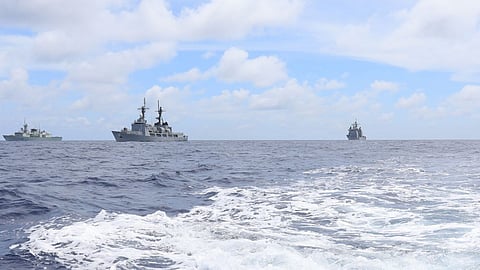
- NEWS
- the EDIT
- COMMENTARY
- BUSINESS
- LIFE
- SHOW
- ACTION
- GLOBAL GOALS
- SNAPS
- DYARYO TIRADA
- MORE

The Philippines has once again conducted a multilateral maritime cooperative activity (MMCA) in the country’s exclusive economic zone in the West Philippine Sea, this time, with Australia, Canada, and the United States.
In a joint statement released on Wednesday, Australian Chief of Defence Force Admiral David Johnston Ran, Canadian Chief of Defence Staff, General M.A Jennie Carignan, Armed Forces of the Philippines Chief of Staff General Romeo Brawner Jr., and US Indo-Pacific Command Chief Amiral Samuel Paparo have committed to upholding the right to freedom of navigation and overflight during MMCA from 7 to 8 August.
The four military chiefs emphasized that other lawful uses of the sea and international airspace as well as respect for maritime rights under international law, as reflected in the UN Convention on the Law of the Sea (UNCLOS) were strictly performed during the MMCA.
They also noted that the MMCA demonstrates the four countries’ “collective commitment to strengthen regional and international cooperation in support of a free and open Indo-Pacific.”
The naval and air force units of these participating nations will operate together in a bid to enhance cooperation and interoperability among the four armed forces.
The military chief also stressed that the activity “will be conducted in a manner that is consistent” with international law and with due regard to the safety of navigation and the rights and interests of other States.
“We stand together to address common maritime challenges and underscore our shared dedication to upholding international law and the rules-based order,” the joint statement read.
“Our four nations reaffirm the 2016 South China Sea Arbitral Tribunal Award as a final and legally binding decision on the parties to the dispute,” it added.
In a phone interview, Navy spokesperson for the West Philippine Sea Rear Admiral Roy Vincent Trinidad said the latest maritime sail serves as the first MMCA involving these four countries.
“[The activity] was conducted in our EEZ and within the bounds of international law. It supports the 2016 Arbitral Tribunal ruling of a free and a free and open Indo-Pacific,” Trinidad said.
Trinidad dismissed the speculations that the most recent MMCA is a show of force directed towards a particular country.
“It is not designed against any particular country but is a collective expression of support for a rules-based international order,” he stressed.
